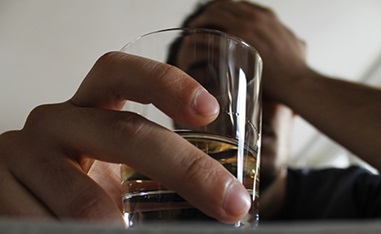
Here’s what binge drinking is doing to your health
Are you a binge drinker? Get the facts on binge drinking and the potential health risks.We all know that regularly drinking too much alcohol can be harmful for our health.
We do know for certain that your chances of suffering the short-term harmful effects of drinking increase up to fivefold after drinking five to seven units of alcohol.
What is binge drinking?
The NHS binge drinking definition is: 'drinking lots of alcohol in a short space of time or drinking to get drunk.' Researchers refer to binge drinking as the consumption of more than eight units in a single session for men, and more than six units for women. There are roughly two units of alcohol in a pint of beer or cider, a 175ml glass of wine, or a double measure of spirits.
While this is a handy rule of thumb, the reality is that everyone has a different tolerance for alcohol. It's not easy to say exactly how many units of alcohol constitutes a binge drinking session for any individual person. However, we do know for certain that your chances of suffering the short-term harmful effects of drinking increase up to fivefold after drinking five to seven units of alcohol.
The dangers of binge drinking
Drinking lots of alcohol in a short space of time is dangerous because your body can't deal with it properly. You can process approximately one unit of alcohol per hour, so drinking at a faster rate than this will raise your blood alcohol concentration and cause you to feel drunk quickly.
Binge drinking and getting drunk can be dangerous for both your physical and your mental health. As well as the easily recognisable short-term effects, there are some potential longer-term effects of drinking a lot in a single session.
The effects of binge drinking include:
Accidents and falls
Being drunk affects your balance and co-ordination, making you more likely to injure yourself in an accident or fall. In an extreme situation, you could be involved in a life-threatening accident.
Aggression
The majority of people who drink are never violent, but drinking a lot in a short space of time increases your chance of becoming aggressive. You're also more likely to end up on the receiving end of someone else's aggression.
Overdosing
If you drink so much alcohol that you overdose and fall unconscious, there is a risk that your breathing or heartbeat could stop. You also run the risk of choking on your own vomit.
Memory loss and low mood
If you have a very heavy night, chances are you'll have gaps in your memory or even a total mind blank. Drinking a lot can also cause low mood and can lead to depression and other mental health problems in the longer term.

How to reduce the risks of binge drinking
As long as you're not dependent on alcohol, it is relatively simple to take steps to reduce the risk to your health from a single drinking session. Try to get into the habit of:
- Drinking more slowly, alternating each alcohol drink with a glass of water or a soft drink
- Drinking with a meal, or eating to line your stomach before having any alcohol
- Planning ahead, to make sure you're with people you trust and you know how you're going to get home
If you regularly drink more than the recommended amount in one go... it may be time to get help with binge drinking.
What to do if you're a binge drinker
To find out whether your drinking habits pose a risk, take the DrinkAware alcohol self-assessment. It's free, fast and totally confidential.
If you regularly drink more than the recommended amount in one go or you recognise any of the effects of drinking described above, it may be time to get help with binge drinking. There are lots of places to seek support and find more information if you are worried about how much you're drinking.
- You can call the national alcohol helpline, Drinkline, on 0300 123 1110. It's completely free and confidential
- Get an assessment at a Circle Health Group hospital. A counsellor will use this to understand you better as a person and determine what kind of help and support would be most useful to you
- Alcoholics Anonymous is a support group for people who are dependent on alcohol, and there are branches across the country. You can find out more about Alcoholics Anonymous and find your local branch on their website
Tags
How do I book an appointment?
If you're concerned about symptoms you're experiencing or require further information on this subject, talk to a GP or see an expert consultant at your local Circle Hospital.